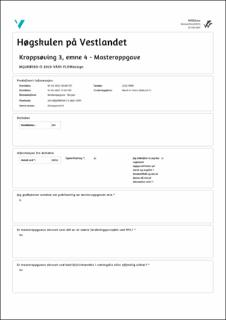| dc.description.abstract | The theme of this thesis is the concept of bodily learning, and how it is presented within the Norwegian curriculum of physical education. Currently there is little agreement on what bodily learning within physical education represents for the scientific community, nor how the teachers of the subject can work with operationalizing the concept. The aim of my study is to contribute to a meaningful, theoretically- and scientifically viable operationalization of the concept.
Within the curriculum, bodily learning is defined as “referring to” three different components, Motoric learning, Joy of movement and Body awareness. I will maintain a phenomenological approach throughout my thesis, suspending my analytic gaze, and keeping an open mind towards new insights I may encounter throughout my analyses. As such, my entire thesis may be regarded as a phenomenological exploration of bodily learning’s definition in the curriculum. I utilize two methods for achieving my aim presented above. Firstly, I will conduct an exploratory literature analysis, where I will be turning to interdisciplinary literature to get a grasp of the theoretical development and roots of the individual components. Secondly, I will build on what I have learned in the first analysis and review the same components through a Husserlian-phenomenological rubric, formulated by Lanei Rodemeyer(2020).
In short, through my analyses I find that bodily learning’s definition in the PE-curriculum leaves ample room for the concept being understood as a holistic, embedded and multileveled construct. This contrasts with the sentiment of the scientific field, which proposes that bodily learning in physical education is narrowly defined. Through what I have learned, I am able to point to concrete practical implications towards my finding contribute to teachers’ understanding of the concept and support their navigation in different physical education contexts. Regarding bodily learning as more than the sum of its components as they materialize in the pupils' active consciousness, allows for teachers to understand pupils’ rich and complex existence as moving bodies in the world, beyond narrowly expressed interpretations that have permeated physical education historically | en_US |

